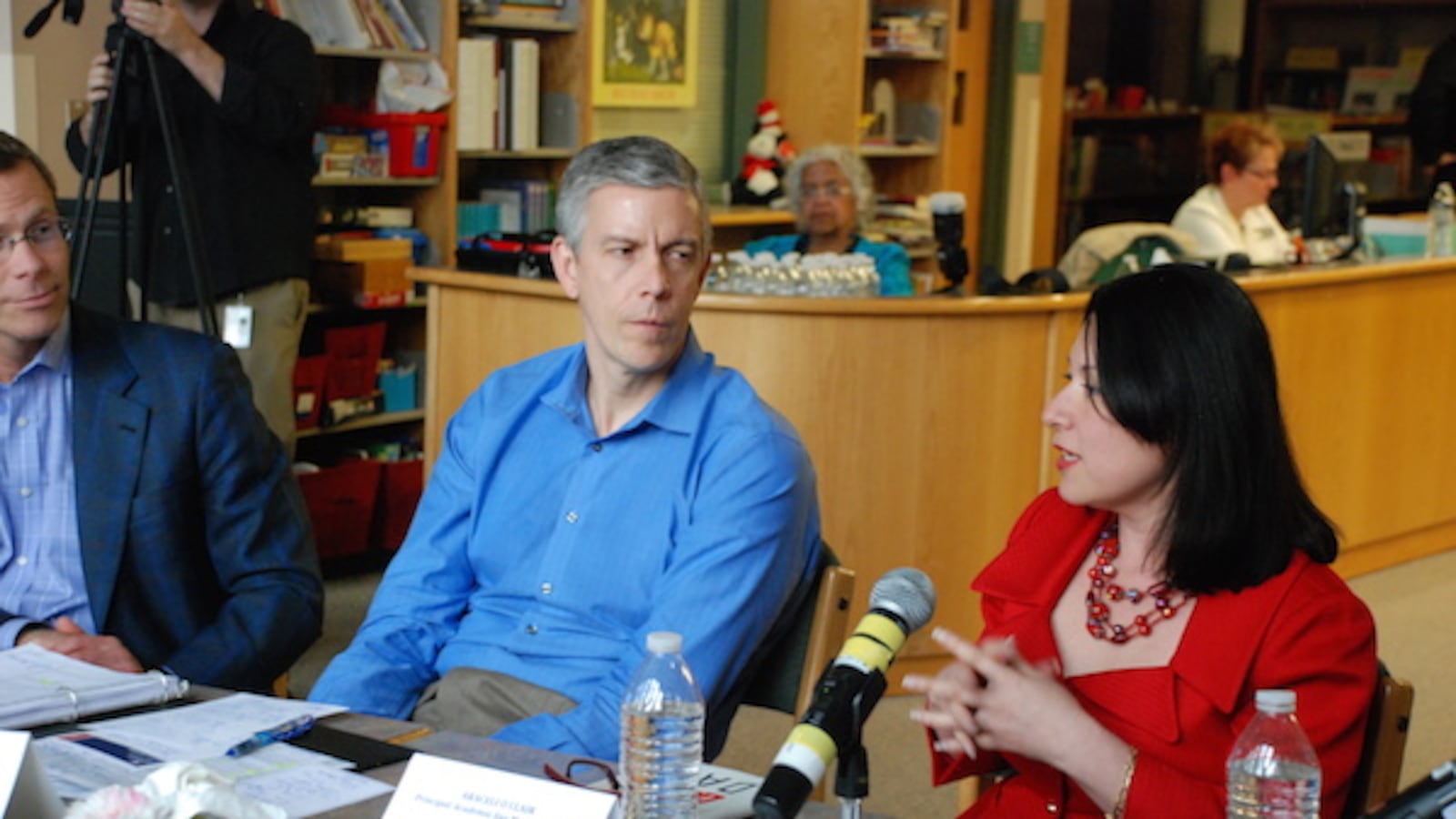Improving union relations, fixing future educators’ education and training leaders with the skills needed to improve struggling schools: these were some of the suggestions a group of Denver principals and teachers had Thursday for U.S. Secretary of Education Arne Duncan.
Duncan met with teachers in Denver’s pilot leadership program and some of the district’s principals at Academia Ana Marie Sandoval in a whirlwind tour of some of Colorado’s reform hot spots. He spent the morning at Skyline High School, a STEM-focused school in Longmont.
Denver superintendent Tom Boasberg and the assembled educators presented the district’s work on overhauling leadership structures both for principals and teachers.
Those include expanding mentoring programs for aspiring principals; eliminating cost barriers to licensure; and providing opportunities for teachers to take on responsibilities, without leaving the classroom.
Some had pointed words for the U.S. Secretary of Education, especially on the subject of union relations.
“How do we have those voices not always seem us versus them?” said one principal.
Another took on the country’s university system for teaching educators: “They have kinda archaic systems,” said Julie Murgel, who leads Cole Arts and Science Academy, one of the Denver’s early innovation and turnaround schools.
Here are three other points we took from the conversation:
Windy roads to turnaround leadership
While most of the principals and teachers Duncan spoke with worked in Denver turnaround schools, they represented a wide range of experience, training and strategies.
Take, on the one hand, leaders like Jamie Roybal, the principal at Gust Elementary, a southwest Denver school that recently climbed out of the district’s second-lowest ranking for schools. Roybal climbed up through the ranks through traditional means but has helped pilot a program where teachers take on some of the responsibilities of a principal, including educator evaluations and mentoring.
On the other hand, many around the table were more like Sara Gips, who leads McGlone Elementary, a turnaround school in Montbello. She started her teaching career in Argentina, before joining TFA in Denver. She is in her first year as a principal, after completing residencies at McGlone and at Orchard Elementary in Boston.
“I haven’t had as many years of leadership experience as many turnaround school principals but my training was so specific,” Gips told Duncan. And in her first year, she has turned to many of the district’s principals with more experience for support.
Many of the teachers on the panel said that finding ways for them to pitch in was crucial.
“The idea of teacher leadership is magic,” said Jonell Pineda, a teacher at Cole, which is a pilot location for the teacher leadership program.
And lighter workloads may keep principals in the building longer, said district officials.
“If they can distribute and share those responsibilities, we’ll be able to lessen the burden,” said Denver superintendent Tom Boasberg.
The man’s keeping you down (and trying to change that)
Running a school isn’t just about teachers. Principals have to navigate complicated, non-intuitive and paperwork-heavy bureaucracies every day.
When asked what the Department of Education could do to make his job easier, Zachary Rahn at Ashley Elementary said, “reduce bureaucracy.”
Obscure bureaucratic reasons force them to do nonsensical things like throw out gallons of milk, Rahn said. And while officials might like to say, “just keep the milk,” there are weird rules that keep them from doing so.
In an interview after the panel, Duncan said streamlining the bureaucracy was a top priority for the department, although their efforts were in the early stages.
“So much of our office has been set up around funding streams,” he said. Instead of separate desks for Title I and other funding sources, the department is moving towards integrating those funding sources and providing a single contact point for each state.
For example, Duncan said, “go to the Colorado state desk.” While it might seem like a small shift, said Duncan, in Washington it “is a radically different way of thinking.”
The change could also help rural districts that struggle with lots of paperwork and skeleton staffs to complete it.
“This will make those separate and seemingly complex roles much more integrated,” said Duncan.
But what about the money?
One big question, which remained unanswered at today’s event, was how to fund improvement.
Both the principals present and Superintendent Boasberg called out the funding through turnaround grants and other sources as crucial to their success.
But what happens when that money runs out?
“If [the situation] only changes if the money is there, that won’t work,” said Duncan. There has to be planning for how to sustain changes.
Part of that, Duncan says, is going to have to come from other partners, whether in school districts or in the community.
“It can’t just be our resources,” said Duncan. “We have to have other folks buying in.”
And that may be even more crucial as national politics come into play.
“We’ve gotten huge pushback from both sides of the aisle,” said Duncan. Competitive grants for improving struggling schools and providing teachers pay incentives — both of which helped pay for much of the work described on the panel — are hated by many Democrats and Republicans alike.


